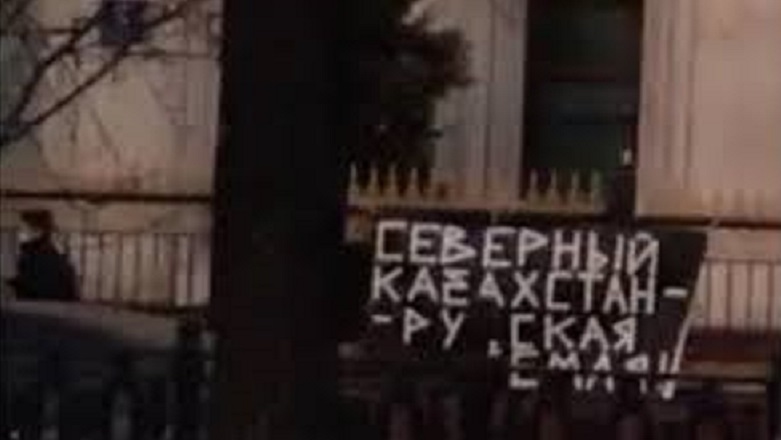The 'Russian world' of northern Kazakhstan
The Petropavlovsk region bears even in its name the memory of Russian tsarist rule, and many indicators, not only political, but also social and economic, confirm the separatist moods of a large part of its population.
Astana (AsiaNews) - Inquiries about the prospects for northern Kazakhstan, the region with a strong ethnic Russian presence, also called the Crimea or the Kazakh Donbass, are multiplying in the Russian and international press. Although there are no tensions on the level of south-eastern Ukraine, many believe that separatism in this area is set to grow further.
The analogy with Crimea has an obvious historical basis: as with the Black Sea peninsula, transferred from Russia to Ukraine, the party secretary Nikita Khruščev decided in the early 1960s to create the so-called 'Tselinnyj district' or 'Virgin Lands', into which five regions of Kazakhstan (of Kokšetau, Kustanaj, Pavlodar, Petropavlovsk and even Akmola, now Astana) were included, to be transferred to the territory of the Russian Soviet republic Rsfsr, in a plan to redistribute territories 'from above'.
The chairman of the council of the Kazakh republic Kssr, Žumabek Tashenov, was opposed to the initiative and succeeded in stopping it, paying for it personally with the loss of his office.
North Kazakhstan today partly coincides with the Petropavlovsk region, which also bears in its name the memory of Russian tsarist rule, and many indicators, not only political, but also social and economic, confirm the separatist mood of a large part of its population.
It is not only, and not primarily, a matter of 'oppression of the minority' or the imposition of the Kazakh language, as in the case of Ukrainian in the Donbass, this process being much less impetuous than in Ukraine or other former Soviet countries, even though it is the order of the day.
On the other hand, supporters of the Russkij mir ideology, which envisages Russia's leading role over all peoples historically linked to it, are growing in the area.
The Russians in northern Kazakhstan only watch Russian television programmes, communicate only in Russian on social networks, many even have Russian passports generously granted by Moscow along with their Kazakh passports, and for this they can even receive a pension from Russia.
Nostalgia for the Soviet times is widespread, along with anger at the backward economic conditions of the region, which has a lower standard of living than the rest of Kazakhstan as a whole, going from colonisers to 'marginalised'.
Currentime correspondent Timur Ermašev toured the towns and villages of northern Kazakhstan, trying to understand how deep these feelings are rooted among the inhabitants.
The investigation was prompted by the outcry of a video released last April from Petropavlovsk, in which some 20 people calling themselves the 'Workers' People's Council' declared their intention to secede from Kazakhstan on the basis of the 1937 Soviet constitution granting 'independence, autonomy and sovereignty to the Soviet peoples'.
The General Prosecutor's Office of Kazakhstan immediately opened proceedings to verify this group, and in June two people, Denis Rudnik and Kristina Kolčenko, were convicted on charges of 'inciting division and separatism in society'.
The two had also expressed their support for a possible 'special military operation' by Moscow in northern Kazakhstan, stating that 'Uralsk has always been a Russian city', like Pavlodar, Ust-Kamenogorsk and Semipalatinsk, some of the main centres in the area, and launching a cry of distress to Russia: 'Take us with you! The region's capital Petropavlovsk is in fact the only city in the country where Kazakhs are not the majority ethnic group, representing only 33% of the inhabitants against 53% Russians, although so far there have been no problems with coexistence.
There is even a unique monument in which the figures of the two peoples' greatest poets, Aleksandr Pushkin and Abaj Kunanbaev, stand on the same base.
From Russia, the Kremlin's propaganda continues to advocate the 'Russian-ness' of these areas, and the need to support the 'nationalism' of the compatriots and the defence of their cultural and political identity, in tones very similar to those used for years against the Donbass.
The presenters ask the audience, who impersonate the Kazakh Russians, the question "Are you waiting for the Russian world there?", and everyone enthusiastically replies "Yes, yes!". Many Russians had come in Khruščev's time, to cultivate the 'virgin lands', and now they claim the 'Russian virginity' of this vast territory, lying between the Siberian tundra and the Kazakh steppes.
25/05/2023 09:28
28/12/2022 08:44
22/06/2022 10:07







.png)










